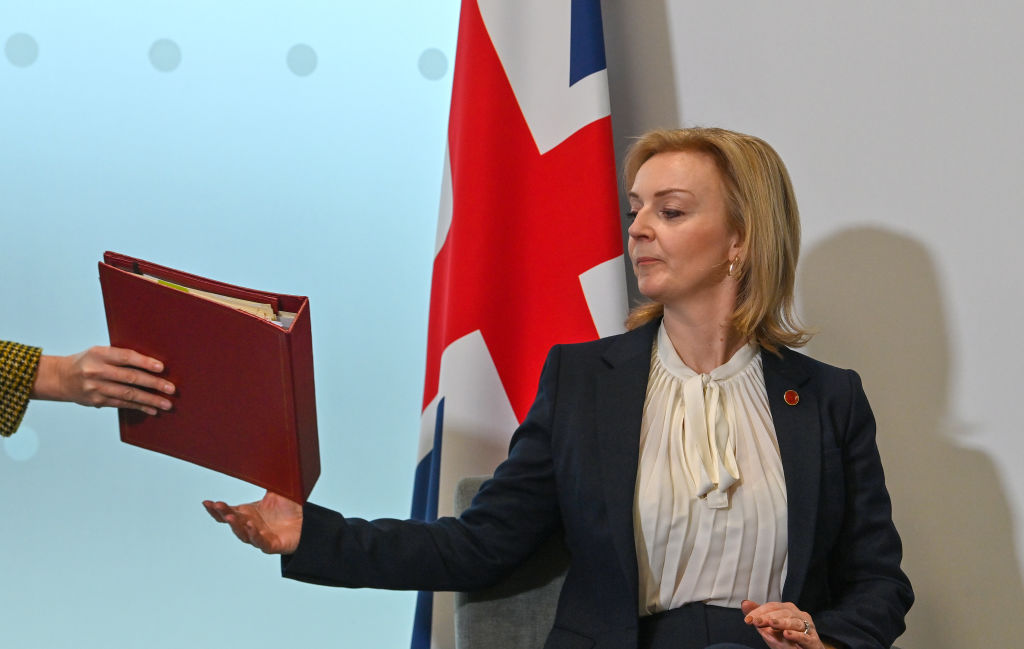U.K. foreign secretary threatens 'severe consequences' if Russia invades Ukraine


A free daily email with the biggest news stories of the day – and the best features from TheWeek.com
You are now subscribed
Your newsletter sign-up was successful
Invading Ukraine would be a "strategic mistake" that would lead to "severe consequences for Russia," United Kingdom Foreign Secretary Liz Truss said Friday ahead of a weekend G7 meeting in Liverpool, BBC reports.
Around 94,000 Russian troops have massed on the Ukrainian border, and intelligence estimates obtained by The Washington Post suggest that the invasion could come as early as January 2022 and involve 175,000 troops. CIA Director William Burns warned Monday that the build-up of military forces could allow Russia to act "in a very sweeping way."
Truss urged European leaders to reduce their dependence on Russian natural gas and suggested the U.K. might take steps to lock Russian money out of British financial markets. When asked if she could rule out a military response, she said the U.K. is working to bolster Ukraine's "defense and security capability."
The Week
Escape your echo chamber. Get the facts behind the news, plus analysis from multiple perspectives.

Sign up for The Week's Free Newsletters
From our morning news briefing to a weekly Good News Newsletter, get the best of The Week delivered directly to your inbox.
From our morning news briefing to a weekly Good News Newsletter, get the best of The Week delivered directly to your inbox.
During a Tuesday call with Russian President Vladimir Putin, President Biden ruled out the possibility of the U.S. unilaterally sending troops to defend Ukraine if Russia invades, but he did warn Putin that Russia would face economic sanctions "like nothing he's ever seen." According to RAND Corporation analyst William Courtney, military aid would also be on the table and could take the form of anti-tank and anti-aircraft launchers, drones, and helicopters.
Putin has repeatedly accused Ukraine of provocations and objected to NATO activities within what he regards as Russia's natural sphere of influence. Ukraine ousted a pro-Putin government in 2014 and has drifted closer to the West ever since. Support for joining NATO among Ukrainians reached 54 percent this year, up 40 percent from 2012.
A free daily email with the biggest news stories of the day – and the best features from TheWeek.com
Grayson Quay was the weekend editor at TheWeek.com. His writing has also been published in National Review, the Pittsburgh Post-Gazette, Modern Age, The American Conservative, The Spectator World, and other outlets. Grayson earned his M.A. from Georgetown University in 2019.
-
 Why are election experts taking Trump’s midterm threats seriously?
Why are election experts taking Trump’s midterm threats seriously?IN THE SPOTLIGHT As the president muses about polling place deployments and a centralized electoral system aimed at one-party control, lawmakers are taking this administration at its word
-
 ‘Restaurateurs have become millionaires’
‘Restaurateurs have become millionaires’Instant Opinion Opinion, comment and editorials of the day
-
 Earth is rapidly approaching a ‘hothouse’ trajectory of warming
Earth is rapidly approaching a ‘hothouse’ trajectory of warmingThe explainer It may become impossible to fix
-
 What is ‘Arctic Sentry’ and will it deter Russia and China?
What is ‘Arctic Sentry’ and will it deter Russia and China?Today’s Big Question Nato considers joint operation and intelligence sharing in Arctic region, in face of Trump’s threats to seize Greenland for ‘protection’
-
 What would a UK deployment to Ukraine look like?
What would a UK deployment to Ukraine look like?Today's Big Question Security agreement commits British and French forces in event of ceasefire
-
 Would Europe defend Greenland from US aggression?
Would Europe defend Greenland from US aggression?Today’s Big Question ‘Mildness’ of EU pushback against Trump provocation ‘illustrates the bind Europe finds itself in’
-
 Did Trump just end the US-Europe alliance?
Did Trump just end the US-Europe alliance?Today's Big Question New US national security policy drops ‘grenade’ on Europe and should serve as ‘the mother of all wake-up calls’
-
 Is conscription the answer to Europe’s security woes?
Is conscription the answer to Europe’s security woes?Today's Big Question How best to boost troop numbers to deal with Russian threat is ‘prompting fierce and soul-searching debates’
-
 Trump peace deal: an offer Zelenskyy can’t refuse?
Trump peace deal: an offer Zelenskyy can’t refuse?Today’s Big Question ‘Unpalatable’ US plan may strengthen embattled Ukrainian president at home
-
 Vladimir Putin’s ‘nuclear tsunami’ missile
Vladimir Putin’s ‘nuclear tsunami’ missileThe Explainer Russian president has boasted that there is no way to intercept the new weapon
-
 The Baltic ‘bog belt’ plan to protect Europe from Russia
The Baltic ‘bog belt’ plan to protect Europe from RussiaUnder the Radar Reviving lost wetland on Nato’s eastern flank would fuse ‘two European priorities that increasingly compete for attention and funding: defence and climate’
